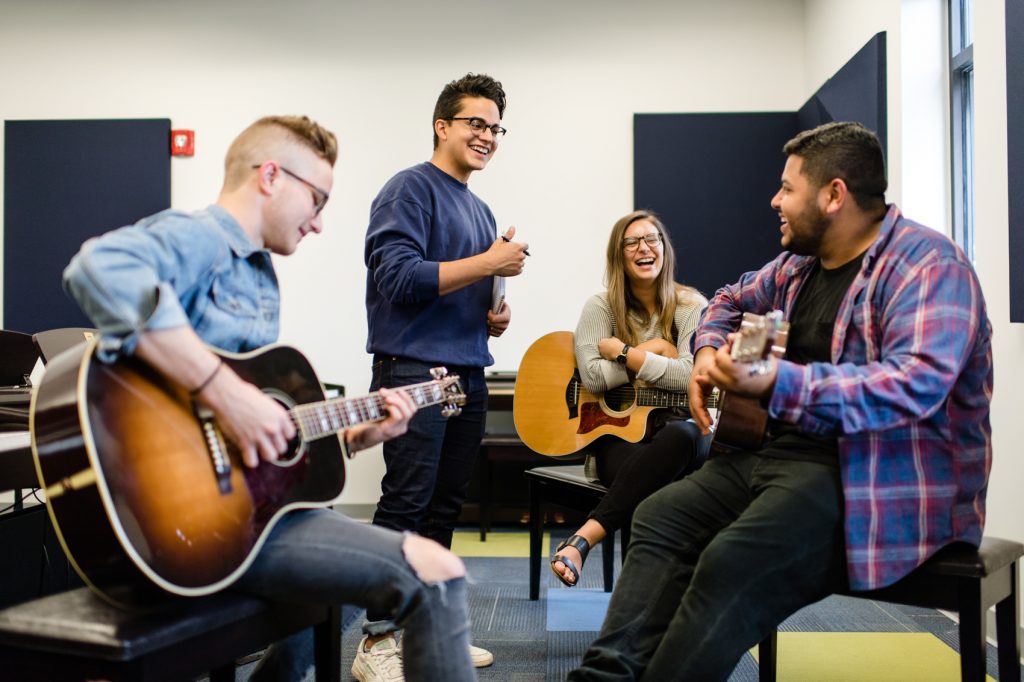The SEU Foundational Core Experience
Academics » Foundational Core » Divine Design Resource Center
You have a number of options available to earn your Divine Design credit hours. The number of required hours varies by major, so be sure to review the degrees audits available in the university catalog to confirm the requirements for your program of study.
Get college credit for some of the activities you’re already doing! Experiential learning allows you to take the ideas that you’ve encountered in the classroom and put them into practice in a real-life vocational setting, under the guidance of professionals. Examples include:
Taken as part of your Divine Design requirements or as an add-on to your educational journey, certificates are a great way to enhance your knowledge with skills and training that are immediately applicable to the workplace. Learn more here.
You minor (or minors) can relate to your major or can broaden your knowledge base by giving you the opportunity to delve into a completely different field. To find a minor, visit the SEU Catalog, choose Undergraduate, and select the applicable catalog year. Then, click Programs of Study on the left-hand side, and the minors available will be listed under their corresponding department.
To declare a minor, log in to MySEU, hover over Academics, select Registrar, and then complete the Major/Minor Program Declaration Form. Follow the instructions on the form and select the minor(s) you wish to add.
In MySEU, hover over Academics, select Registrar, and then complete the Major/Minor Program Declaration Form. Select both your current major and your new major.
An elective is any college-level course that does not satisfy a specific program requirement in the Foundational or Major Core. You can find electives with one of these options:
Contact advising@seu.edu for tips to find additional general elective options.
The face-to-face sections of CORE 3113 have special topics of focus referenced above. In the online version, we move through the following sequence of modules, and you get to choose your own topic!
Here’s an overview:

SEU Tech Certificate, Cybersecurity
Offered via the Jannetides College of Business, Communication & Leadership
Offered via the Jannetides College of Business, Communication & Leadership
Offered via the Barnett College of Ministry & Theology
Classical Education, Minor - Online Delivery
Offered via the College of Education
See Catalog for details
So many experiences — from volunteering to the job you have as you work your way through college — teach you skills that you can apply in multiple contexts. That’s why Practicum Credit, which is experience that includes learning and skill-building, is such an exciting option for students.
By leveraging the value you gain from these types of activities, and providing the appropriate documentation/supervisor review, you will earn credit toward your degree and learn how to apply what you learn to your calling.
All that is needed for practicum experience to take place is a supervisor, a student, and for learning to be happening. General practicum options may include, but are not limited to:


The student will be required to log in to the practicum course on MyFire to reflect on what they are learning throughout this experience.
Students must complete a minimum number of documented contact hours (supervised work hours) in a 16-week semester.
General and Major-Specific Practicum
Required, major-specific internships and practicum courses which are built into degree requirements (e.g. PMIN 2303 for site-based students or internships completed by education majors) are not considered general practicum.
However, students can choose to add a general practicum to their degree journey with other experiences, such as volunteering. If you are unsure if your major has a specific practicum requirement, please connect with your academic advisor.
Youth Group Volunteer
Under the supervision of the youth pastor, a student volunteers at a church’s youth group for 2 hours on Wednesday evenings and 1 hour on Sunday mornings, for a total of 3 hours per week. This experience is documented and reflected on, and signed off on by the youth pastor. The student earns 1 practicum credit hour for the semester.
Student Leader
Under the supervision of their Resident Director, a student leader serves as a Resident Assistant and documents the work hours they complete each week, for at least 7.5 hours a week. The Resident Director confirms the work hours and signs off on the learning that has taken place. The student earns 3 practicum credit hours for the semester.

Log in to JICS, and then find your course based on your student type.
Look for PRAC with MAIN CAMPUS listed as the location.
Example course code: PRAC 1001 01 ON
Look for PRAC with ONLINE listed as the location.
Example course code: PRAC 1001 90 ON
For External Companies and SEU Departments
If you have opportunities for students to receive practicum credit, please complete this form and our Experiential Learning team will be in touch with you.